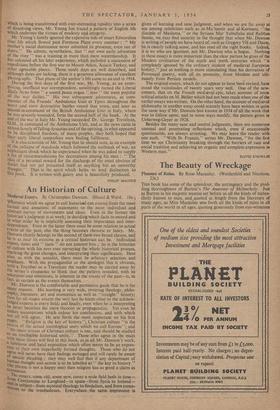An Historian of Culture
Medieval Essays. By Christopher Dawson. (Sheed & Ward. 16s.)
given of learning and sane judgment, and when we are far away at sea among celebrities such as al-Mu'tamin and al-Karmani, "the disciple of Maslama," or the Syrians Mar Yabullaha and Rabban Sauna, we, may find security in the thought that when Mr. Dawson is writing of people we have heard of, such as Gregory VII and Dante, he is clearly talking sense, and has read all the right books. Indeed, it is we who are ignorant, not Mr. Dawson who is bogus. Nothing in these essays is more important than the clear picture he gives of the Moslem civilisation of the ninth and tenth centuries which "is completely ignored by the ordinary student of medieval European history," just as nothing is more stimulating than his derivation of Provencal poetry, with all its posterity, from Moslem and ulti- mately from Persian models.
The original essays, which do not appear to have been revised, have stood the vicissitudes of twenty years very well. One of the new- comers, that on the French medieval epic, takes account of some critical attacks on M. Fiedler which had not been made when one of the earlier essays was written. On the other hand, the account of medfwval philosophy in another essay could scarcely have been written in quite the same way if Mr. Dawson had known in 1934 of all the work that was to follow upon, and in some ways modify, the picture given in Ueberweg-Geyer in 1928.
Besides the many sane and central judgments, there are numerous unusual and penetrating reflections which, even if occasionally questionable, are always arresting. We may leave the reader with one such. "With St. Francis," writes Mr. Dawson, "for the first time we see Christianity breaking through the barriers of race and social tradition and achieving an organic and complete expression in Western man."
DAVID KNOWLES










































 Previous page
Previous page